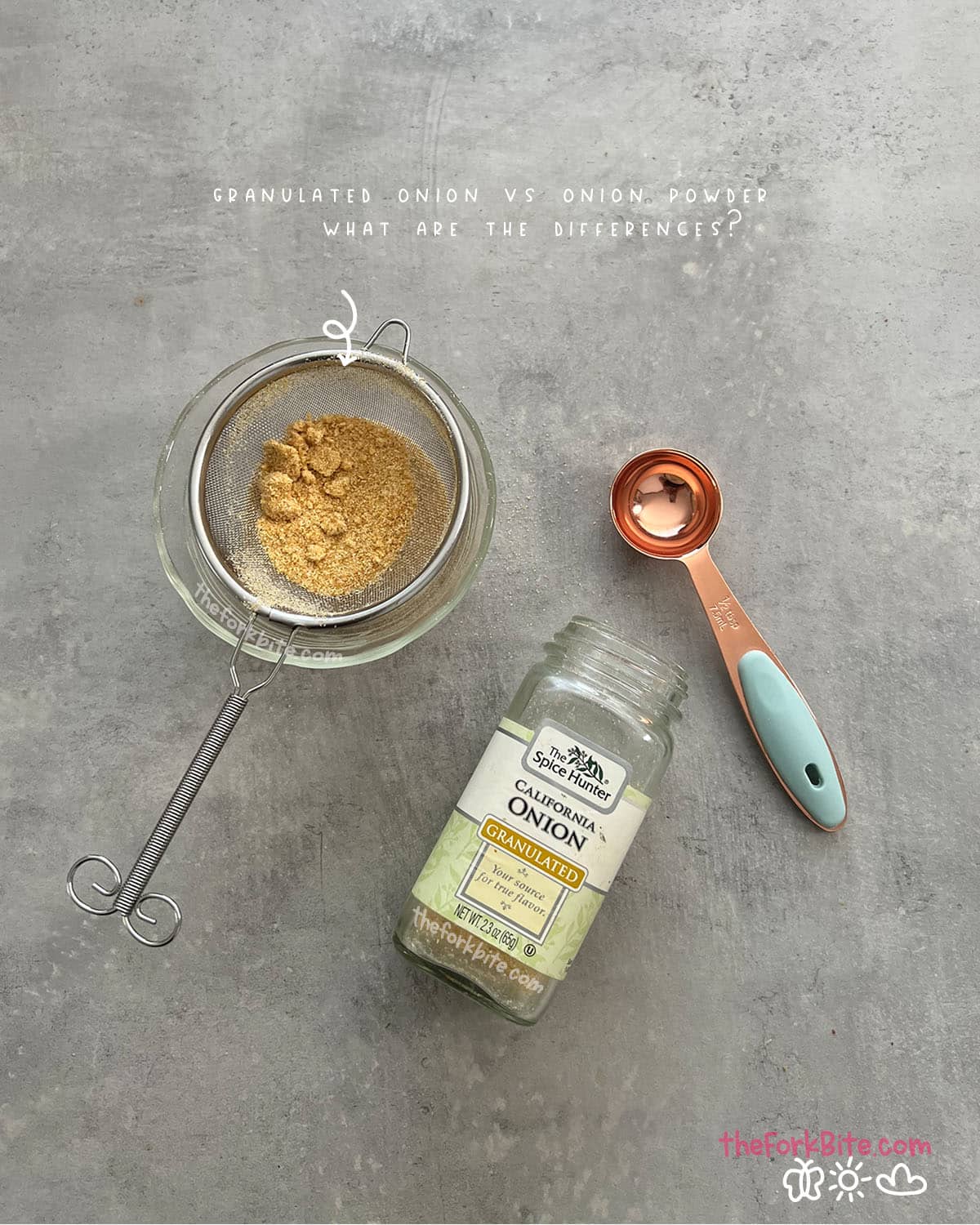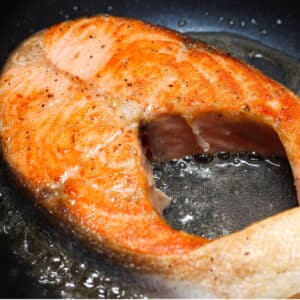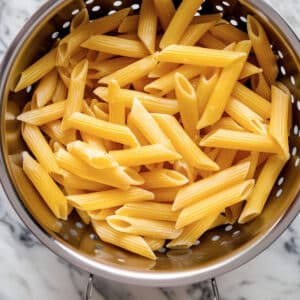Are you familiar with the different types of onion? There are three main types: granulated, powdered, and fresh onions. Each of these has unique properties that make them ideal for different uses in cooking.
So, what's the difference between a granulated onion and onion powder? This blog post will discuss the differences between granulated onion and onion powder—the shelf life of the product, and the best uses for it.
Granulated onion is also known as a minced onion or chopped onion. Strong and pungent in flavor, this onion adds savory flavor to dishes. The dried, chopped onions are ground into small grains to make granulated onion.
As a method of making onion powder, onions are dried and ground into a fine powder. Onion powder is also known as onion flour or dehydrated onion. This onion has a more subdued flavor than granulated onion and works well as a seasoning in both savory and sweet recipes.

Granulated onion vs onion powder
It is a common debate in the culinary world. Both have their pros and cons. Which one you prefer really depends on your personal preferences.
Why is that? Well, let's start with a brief description of each.
Granulated onion is made from dehydrated chopped or ground onions. The resulting product has a coarse texture like fine cornmeal and a strong onion flavor. Onion powder is made from dehydrated onions that have been ground into a fine powder. This results in a product with a milder flavor and a finer texture.
So, what are the key differences between these two ingredients?
For starters, granulated onion has a stronger flavor than onion powder. This is because the onion pieces are still intact and have not been broken down as much. As a result, they retain more of their natural flavor.
Onion powder, on the other hand, has a more mellow flavor. This is because the drying process breaks down the onions and releases their natural sugars. In this way, the taste becomes mellow and less sharp.
So, which one should you use? It depends on your personal preferences. If you're looking for an intense allium flavor in your dish, go with granulated onion; if you just want a hint of sweetness and savoriness, stick with onion powder.
Between granulated onion and onion powder, there are a few key differences to keep in mind. Here's a closer look at both so you can decide for yourself!
1 Texture
First, let's start with their texture. Granulated onion is, well, granulated or has a sandy texture. On the other hand, onion powder has a powdery texture due to its fine grind. Its texture is similar to that of other ground spices, such as garlic powder or chili powder. While their textures are different, you can substitute either for the other.
2 Concentration
Onion powder is more concentrated than granulated onion, meaning that you need to use less of it to achieve the same flavor profile. Why is that? Food is ground into a powder, resulting in more surface area. That increased surface area means that it can release more of the onion's flavor compounds.
So, if a recipe calls for 1 teaspoon of onion powder, you would only need to use ¼ teaspoon of granulated onion to achieve the same flavor.
Here are some more things to keep in mind about granulated onion vs onion powder:
- Granulated onion has a more sharp and pungent flavor, while onion powder is more mellow and sweet.
- Granulated onion is best used as a savory component in dishes like stews, soups, and sauces. Onion powder is more versatile and suitable for savory and sweet dishes.
- It is not always easy to find granulated onion in stores, while onion powder is widely available.
3 Flavor
Another factor to consider when deciding between granulated onion and onion powder is flavor. As you may have guessed, granulated onion is more flavorful than onion powder. This is because granulated onion still contains some of the oil that gives onions their characteristic flavor. Onion powder, on the other hand, has had this oil removed.
Remember, granulated onion is made from onions bulbs that have been dried and then ground into a fine powder. This process does not remove the onion's natural oils. Onion powder, on the other hand, is made from onions cooked to release their moisture content. This cooking process also removes the onion's natural oils.
So, if you're looking for a milder flavor, onion powder is the way to go. But if you want a stronger flavor, go with granulated onion.
4 Usage
Now that we've gone over the three main factors to consider when deciding between granulated onion and onion powder let's talk about usage.
It is common to replace fresh onions in recipes with granulated onions. This is because it's easier to measure and doesn't need to be chopped. Onion powder, on the other hand, is often used as a seasoning or flavor enhancer. It's often added to things like soups, sauces, and rubs.
So, if you want to add onion flavor to a dish, onion powder is probably your best bet. But if you need a chopped onion for a recipe, go with granulated onion.
5 Particle size and shape
The particle size of onion powder can vary from very fine to coarse, while granulated onion has a more consistent particle size. This can affect how well the onion powder or granulated onion will dissolve in a recipe.
For example, if a recipe calls for onion powder and you use granulated onion, the granules may not dissolve and give your dish a grainy texture. Because of this, some recipes will specify which form of onion to use.
In general, you can substitute one for the other without too much of a difference in taste or texture.
Granulated Onion: What you need to know
Sometimes called powdered onion, granulated onion comes from bulb onions -- rather than from the green tops -- where the flavor resides. The onions are chopped, dehydrated, and ground to a fine powder that adds a robust flavor to foods such as dips and dressings that don't require cooking.
Adding a little onion flavor is a sneaky way to please fussy eaters without having to reveal the onion bits. You can also use granulated onion instead of chopped onion when cooking, especially if you want a smoother texture. In place of ⅓ cup of freshly chopped onions, you can use one teaspoon of granulated onion.
Here are some tips for using granulated onion:
- Use it as a seasoning for chicken, fish, or vegetables.
- Add it to soups, stews, or sauces for extra flavor.
- Use it in place of onion powder in recipes.
Onion powder: What you need to know
Onion powder is a convenient way to add onion flavor to your favorite recipes. It's also easy to keep onions on hand without them going bad. But what is onion powder, exactly?
Onion powder is made from dehydrated onions that have been ground into a fine powder. It's a versatile ingredient that can be used in both sweet and savory recipes.
One teaspoon of onion powder is equivalent to one medium-sized fresh onion. So if a recipe calls for one tablespoon of onion powder, you can use three tablespoons of chopped fresh onion instead.
Here are some tips for using onion powder:
- Use it as a dry rub for meats or add it to marinades.
- Add it to soups, stews, and chili for extra flavor.
- Sprinkle it on roasted vegetables.
- Mix it into ground beef or turkey before cooking.
- Use it as a seasoning for french fries, potato chips, and other fried foods.
- Add it to salad dressings, dips, and sauces.
- Stir it into pancake and waffle batter.
- Sprinkle it on popcorn or roasted nuts
- Mix it with flour to make a coating for fried foods.
- Use it as a seasoning for eggs, vegetables, or grains.
How about the shelf life?
When it comes to the shelf life of onion powder and granulated onion, there is not much of a difference. Both onion powder and granulated onion will last for about 6 to 12 months for best quality when stored in a cool, dry place.
What is the shelf life of onion powder?
Onion powder has a shelf life of up to two years, provided it is stored in a cool, dry place. However, once opened, you should use it within six months. Why is that? Well, onion powder is made from dehydrated onions with high water content. Over time, the water in the powder will evaporate, making it less potent. Additionally, exposure to air and light will cause the powder to lose its flavor over time.
Read:
Can you extend the shelf life of onion powder?
You can do a few things to extend the shelf life of onion powder. First, store it in an airtight container in a cool, dark place, or you can also keep it in the fridge. Also, use a clean, dry spoon when scooping it out, as moisture can cause it to clump and spoil more quickly.
Finally, if you notice any spoilage, such as a musty smell or a color change, toss it out and get a new container. With proper storage, onion powder can last for several months at its peak quality. After that, it will still be usable but may not have as strong of a flavor.
What is the shelf life of granulated onion?
Granulated onion, like most spices, will lose its potency over time. For best results, use within six months of purchase. Beyond that, the flavor will be noticeably weaker. However, the granulated onion will still be safe to consume after a year or two but will have lost much of its flavor by that point.
Can you extend the shelf life of granulated onion?
The shelf life of spices is determined by several factors, including how they are stored and how often they are used. Granulated onion, like other spices, will lose its flavor and aroma over time. Proper storage can help to prolong the shelf life of your spices. Keep granulated onion and other seasonings in an airtight container in a cool, dark place. Replace the lid tightly after each use and use within six months for best results.
The Storage
When purchasing granulated onion or onion powder, a vital factor is how long the product will last before it loses its flavor. If you don't plan on using the product immediately, it's essential to check the expiration date to ensure it will still be fresh when you're ready to use it.
Granulated onion and onion powder should be kept in an airtight container in a cool, dry place like your pantry. Once opened, they will last for several months before the quality declines.
Why? This is because onion powder is more susceptible to moisture and humidity. If it gets too wet, it will clump together and become unusable. On the other hand, the granulated powder is less likely to clump, but it can still lose its flavor if it's not stored properly.
Availability
- Granulated onion is not as readily available as onion powder. You may be able to find it in the spice aisle of your grocery store, or you may need to order it online.
- Onion powder is widely available in the spice aisle of most grocery stores.
- If you can't find onion powder, you can make your own by grinding dried onions in a food processor or coffee grinder.
- Or, you can substitute an equal amount of onion salt for the onion powder called for in a recipe.
Substitutes or alternatives
There are many substitutes for granulated onion and onion powder. The best substitute would depend on the recipe you are using. In general, you can use onion salt, garlic powder, or celery seed as a substitute for granulated onion. For onion powder, you can use onion salt, garlic powder, or dried onion flakes. The best replacement will depend on the flavor you are trying to achieve in your dish.
When substituting, remember that granulated onion is more potent than onion powder. Therefore, you will need to use less of the substitute than the amount of granulated onion called for in the recipe.
For Onion Powder:
If you're all out of onion powder or simply don't have any on hand, there are a few different ingredients you can use as a replacement.
Here are the best substitutes for onion powder.
1 Garlic powder
With its pungent and sharp flavor, garlic powder is a great stand-in for onion powder. It's also a common ingredient in many spice blends, so you may already have some on hand.
Start with less garlic powder than onion powder, and add more to taste. You may also want to add a salt pinch to help balance the flavors.
2 Dried onion flakes
Dried onion flakes are another excellent option if you want onion powder's convenience but a more robust flavor. These flakes are pieces of dried onion that have been chopped up, and you can use them in much the same way as onion powder.
3 Granulated onion
Granulated onion is another form of dried onion similar to onion powder but with a coarser texture. These granules are made by grinding up dried onion, and you can use them in the same way as onion powder.
4 Onion salt
Onion salt is a blend of onion powder and salt and is a substitute for both. This blend is convenient if you want the flavor of onion without having to add salt separately.
5 Onion soup mix
Onion soup mix is a blend of onion powder, salt, and other seasonings, and it makes quick and easy onion soup. This mix is also convenient if you want the flavor of onion alone without having to add any other spices.
Substitute for granulated onion
1 Onion powder:
You can use onion powder as a 1:1 substitute for granulated onion. The result is similar to that of using granulated onion and is the most effortless substitution.
2 Dehydrated onion:
Dehydrated onion can also be used as a 1:1 substitute for granulated onion. The texture of the finished dish may be a little different, but the flavor will be very similar.
3 Fresh onion:
If you don't have any dried onion on hand, you can substitute chopped fresh onion for granulated onion. Use about ¼ cup of chopped onion for every tablespoon of granulated onion called for in the recipe. Keep in mind that using fresh onion will change the dish's flavor slightly.
4 Garlic powder:
Garlic powder can be used as a substitution for granulated onion, but it will also change the flavor of the dish. Use about ¼ teaspoon of garlic powder for every tablespoon of granulated onion called for in the recipe.
5 Dried chives:
Dried chives can be used as a substitution for granulated onion, but they will also change the flavor of the dish. Use about 1 tablespoon of dried chives for every tablespoon of granulated onion called for in the recipe.
When substituting for granulated onion, be aware that the finished dish may taste slightly different than if you had used the granulated onion called for in the recipe.
However, all the substitutes listed above will work well in most recipes. So, if you don't have granulated onion on hand, don't worry! Any of the substitutes listed above will do the trick.




